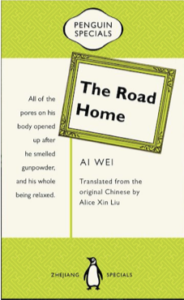 Ai Wei (Author), Alice Xin Liu (Translator, Chinese to English ) , The Road Home, Penguin Random House/Penguin Books, 2019, 81 pages
Ai Wei (Author), Alice Xin Liu (Translator, Chinese to English ) , The Road Home, Penguin Random House/Penguin Books, 2019, 81 pages
Violence, by definition, is the intentional use of force against oneself or others to inflict injury, death or trauma. Despite being widely reprimanded and censured, more often than not, the use of violence is justified, or even celebrated once it is labeled as nationalism. The mistaking of violence for glory is like a ghost that can never be exorcised, and is the basis of countless tragedies. It is therefore a writer’s responsibility to reflect on these tragedies, and ask why they occurred, even if he knows there won’t be any answers. As for readers, it is up to us not to forget.
That is exactly what Ai Wei does in his novel, The Road Home. One of the most lauded authors of the 1960s generation, he writes about the insignificance of a life entangled in a hostile social environment, eulogizing on the greatness and tenacity of human nature by trying to understand our raison d’être. He cares about those who find themselves “under the wheels of creakily-forward-moving history”.
The story takes place around the time of the China-Soviet border conflict, several years after the beginning of the Cultural Revolution. An obsession with violence already permeates the small village where the main protagonist Jiefang, a teenage boy, lives. In school, teachers show students the different modes of Soviet weapons and teach a military drill game to expose and catch “enemy commanders”. Jiefang often confronts his nemesis Strongbull, and their typical way of solving problems is a fist fight.
In the village, people spy and tell on each other, and torture the children of “four sinister elements, or people considered inimical to the new regime”. One day, when the children discover a trench full of bullets, joy “spreads like wildfire” in the village. Jiefang takes an active part in finding and hoarding them.
Trouble comes when Jiefang’s father is reported as a counter-revolutionary for painting a picture of the war hero Dong Cuirun bombing a bunker beneath a portrait of Chairman Mao. To atone for his father’s “crime” and redeem himself as a son of a counter-revolutionary, he has to become a true hero; a scarred soldier in the war. Jiefang makes use of the gun-powder inside a bomb he accidentally finds, and thus embarks on a “heroic” journey.
The story centers on conflict: between Jiefang and Strongbull, between Jiefang’s father and the Revolutionaries, and between “politically correct” people and counter-revolutionaries. In any conflict there must be a winner or a hero.
Violence permeates the air. “Jiefang thinks the smell of gunpowder is the best smell in the whole world, all of the pores of his body open up after he smells gun powder and his whole being is relaxed”. It is every boy’s dream to become a hero and be received with “ drums and gongs”. However, in the end, the euphoria of violence leads only to fear and insecurity; Jiefang constantly escapes into the shells of the bomb for solace.
The story is full of metaphors. The smell of gun powder and the squirrels are particularly interesting, reflecting the antithesis of themes, as if the author were offering his own idea of redemption.
The setting is simple, logical, and almost true to history, with a touch of dramatic exaggeration that lifts the story to a higher level of tragicomedy. It leads us to ponder the uselessness of human endeavor, and the futility of being better or different in an absurd society, especially when this endeavor is tarnished from the very beginning by illusions.
Praise must also be given to Ai Wei’s dispassionate approach to the story. He tells but does not judge or suggest. He is the kind of writer who toys with the shadow of death by using the idea of a blade instead of blood.
Alice Xin Liu’s translation perfectly conveys the details and the mood of the text itself, as many historical facts are made easily approachable through her words. This is not an easy task for a novel with a strong connection with China’s tumultuous past.
If the purpose of this story is to “commemorate the past and enlighten the future”, Ai Wei certainly delivers. Half a century later, we now more than ever need to be reminded of the dire consequences of conflating violence with heroism.
Aiden Heung is a prize-winning poet born and raised on the edge of Tibetan Plateau. He holds an MA in literature from Tongji University in Shanghai, the city he calls home. His poems have been published or are forthcoming in numerous online and offline magazines including Cha: An Asian Literary Journal, Literary Shanghai, Proverse Anthology, The Shanghai Literary Review, New English Review, The Bangalore Review, Esthetic Apostle, Mekong Review, among many other places.He can be found on twitter @AidenHeung or www.aiden-heung.com
